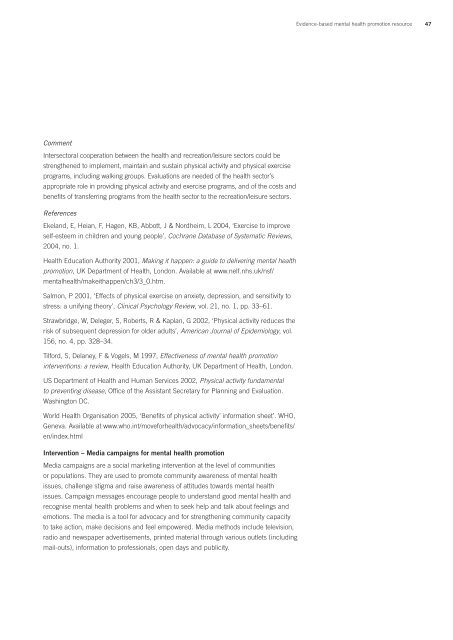Evidence-based mental health promotion resource - health.vic.gov.au
Evidence-based mental health promotion resource - health.vic.gov.au
Evidence-based mental health promotion resource - health.vic.gov.au
Create successful ePaper yourself
Turn your PDF publications into a flip-book with our unique Google optimized e-Paper software.
<strong>Evidence</strong>-<strong>based</strong> <strong>mental</strong> <strong>health</strong> <strong>promotion</strong> <strong>resource</strong>47CommentIntersectoral cooperation between the <strong>health</strong> and recreation/leisure sectors could bestrengthened to implement, maintain and sustain physical activity and physical exerciseprograms, including walking groups. Evaluations are needed of the <strong>health</strong> sector’sappropriate role in providing physical activity and exercise programs, and of the costs andbenefits of transferring programs from the <strong>health</strong> sector to the recreation/leisure sectors.ReferencesEkeland, E, Heian, F, Hagen, KB, Abbott, J & Nordheim, L 2004, ‘Exercise to improveself-esteem in children and young people’, Cochrane Database of Systematic Reviews,2004, no. 1.Health Education Authority 2001, Making it happen: a guide to delivering <strong>mental</strong> <strong>health</strong><strong>promotion</strong>, UK Department of Health, London. Available at www.nelf.nhs.uk/nsf/<strong>mental</strong><strong>health</strong>/makeithappen/ch3/3_0.htm.Salmon, P 2001, ‘Effects of physical exercise on anxiety, depression, and sensitivity tostress: a unifying theory’, Clinical Psychology Review, vol. 21, no. 1, pp. 33–61.Strawbridge, W, Deleger, S, Roberts, R & Kaplan, G 2002, ‘Physical activity reduces therisk of subsequent depression for older adults’, American Journal of Epidemiology, vol.156, no. 4, pp. 328–34.Tilford, S, Delaney, F & Vogels, M 1997, Effectiveness of <strong>mental</strong> <strong>health</strong> <strong>promotion</strong>interventions: a review, Health Education Authority, UK Department of Health, London.US Department of Health and Human Ser<strong>vic</strong>es 2002, Physical activity funda<strong>mental</strong>to preventing disease, Office of the Assistant Secretary for Planning and Evaluation.Washington DC.World Health Organisation 2005, ‘Benefits of physical activity’ information sheet’. WHO,Geneva. Available at www.who.int/movefor<strong>health</strong>/advocacy/information_sheets/benefits/en/index.htmlIntervention – Media campaigns for <strong>mental</strong> <strong>health</strong> <strong>promotion</strong>Media campaigns are a social marketing intervention at the level of communitiesor populations. They are used to promote community awareness of <strong>mental</strong> <strong>health</strong>issues, challenge stigma and raise awareness of attitudes towards <strong>mental</strong> <strong>health</strong>issues. Campaign messages encourage people to understand good <strong>mental</strong> <strong>health</strong> andrecognise <strong>mental</strong> <strong>health</strong> problems and when to seek help and talk about feelings andemotions. The media is a tool for advocacy and for strengthening community capacityto take action, make decisions and feel empowered. Media methods include television,radio and newspaper advertisements, printed material through various outlets (includingmail-outs), information to professionals, open days and publicity.



